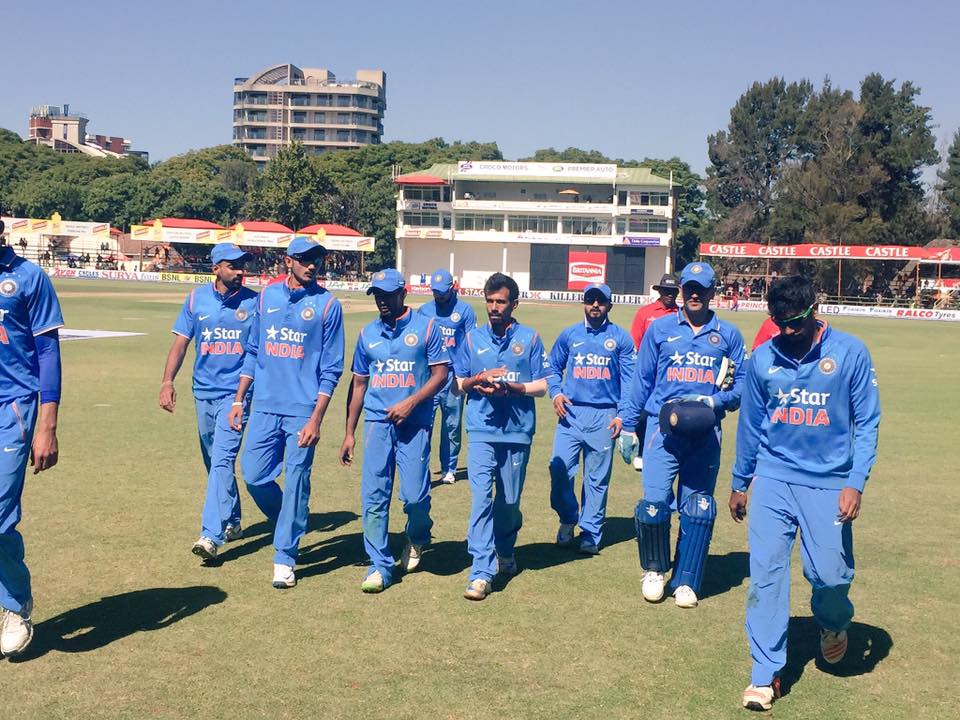Do these India tours to Zimbabwe actually serve any purpose?
The biggest drama of the India-Zimbabwe series appears to be Makhaya Ntini wanting to hang himself from the tomato tree outside the Harare grounds.

One does not know what is more farcical, the fact that someone could think he can hang himself from a slender tomato tree, or the fact that he thought a coach should berate his team in public, or the Zimbabwe Board's decision to appoint this someone as the coach, or the fact that the Indian team makes the African pilgrimage year after year to play out these series.
The first match was so one-sided and boring that only a maiden century by an Indian managed to bring some excitement into it. The second ODI showed some promise thanks to Sibanda but only disappoint further - viewers would have been better off spending the afternoon visiting sedated lionesses leisurely scratching themselves post-siesta at the Harare Zoo. The icing on the cake was MSD's interview ruing the lack of batting practice for the batsmen even after two matches. What was he thinking choosing to chase for the second time? That Zimbabwe will put up a 200+score on board? Bad reading of games by MSD’s standards, one should say.
In that light, are these tours serving any real purpose? Other than filling the gaps in the BCCI's calendar, and providing underpaid cricket writers a break from temporary boredom, one struggles to see a cause in this farce.
The tours are touted to be a great training ground for youngsters. However, when people perform in Zimbabwe it's discounted as a “Zimbabwe performance”. Ambati Rayudu has been in such fine form scoring 62 not out and 41 not out in the two ODIs. The last time he wore the Indian colours was exactly a year before – he scored an unbeaten century on July 10th, 2015 and was then left out in the cold before Harare club came calling again. Kedhar Jadhav also scored a 105 not out on July 14th, 2015. The selectors woke up to find him again conveniently a year later. Same is the case with Stuart Binny who put in all-round displays scoring 77 and taking two wickets, not to add another three-wicket haul. One does not suggest that the players be immediately blooded into the main team ahead of the regulars, but what use is a series if the performances here do not count anyways? On the other hand, a failure on the Zimbabwe tour also means that you are on the blacklist – because after all you cannot fail against 'this side'!
One also wonders why the Indian team has become so 'sanskaari' that these experiments are conducted only in the safe environs of the Harare cricket club once a year. Teams like Australia and England experiment with formations and talent in almost all their tours, while India slips back into 'safe mode' once the Zimbabwe tour ends with the regulars safely ensconced in their respective positions in the team.
Additionally, the gulf between the two is so big that India does not even stand to gain any valuable points in the ICC rankings. Zimbabwe is ranked 11th in the world and for good reason, one would say.
The only argument that would add credence to the tour would be that India is doing a great service to cricket by playing with countries that do not get to play cricket too often. However, the turmoil in the national team and the administration of the sport leaves us with a question of whether this is a deserved move. Zimbabwean cricket has, time and again, proved obstinate to growth and been rife with issues of players being banned for misconduct and failure to reach practice sessions after partying.
One wonders if the tour is more a result of tradition than anything else, and why more deserving countries like Afghanistan do not receive a tour.
One long-term solution for fostering cricket around the world would be to institute a mentor-mentee role among cricketing nations. If South Africa could help with the struggling Zimbabwe cricket as Makhaya Ntini points out, there could indeed be light at the end of the tunnel.
Angered at how his home Board has treated Zimbabwe, Ntini asked, “The first thing I asked when I got here was what is CSA doing to help and I picked up that South Africa is not keen on visiting here and they don’t want much to do with Zimbabwe.
He also went to ask “why they don’t want to support Zimbabwe, (especially since) they are the only other good cricketing nation on the continent.” Fair question, one would agree.
However, all these questions hold only if the administrators of the game are actually interested in growing the game of cricket and have the vision to look at the long-term benefits of an enlarged pool of playing nations, instead of holding on to their safe spots in the hierarchy of the sport, just a bit longer. Only time would tell.

Comments
Sign up or log in to your account to leave comments and reactions
0 Comments